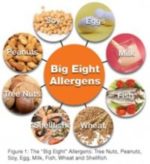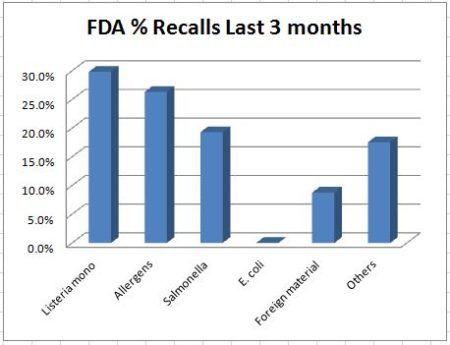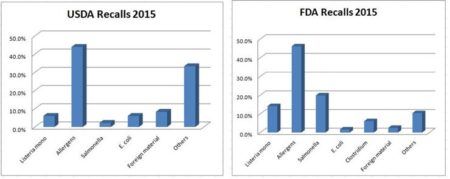Recalls Due to Allergens on the Rise: Why?
Food Allergies on the Rise
Accor ding to FARE (Food Allergy Research & Education) there are an estimated 15 million Americans with food allergies. More that 17 million Europeans have food allergies. In a study released in by the CDC in 2013, food allergies among children increased by 50% between 1997 1nd 2011. The eight foods (the “big 8”) that cause 90% of all food allergies are milk, eggs, peanuts, tree nuts, soy, wheat, fish and shellfish. In 2004 the FDA enacted the Food Allergen Labeling and Consumer Protection Act (FALCPA), requiring that foods are labeled to identify the 8 major allergens.
ding to FARE (Food Allergy Research & Education) there are an estimated 15 million Americans with food allergies. More that 17 million Europeans have food allergies. In a study released in by the CDC in 2013, food allergies among children increased by 50% between 1997 1nd 2011. The eight foods (the “big 8”) that cause 90% of all food allergies are milk, eggs, peanuts, tree nuts, soy, wheat, fish and shellfish. In 2004 the FDA enacted the Food Allergen Labeling and Consumer Protection Act (FALCPA), requiring that foods are labeled to identify the 8 major allergens.
Recalls on the Rise
 FDA food recall events due to the “Big 8” allergens have steadily increased between 2006 and 2012. The major allergens triggered 34% of all FDA food recalls in 2014 and were the leading reason for recalls of FDA-regulated food products during the first half of 2015. In the last 3 months undeclared allergens accounted of 26% of the FDA recalls. For USDA the leading reasons for the nearly 150 FSIS recalls in 2015 were due to undeclared allergens (40%), followed by microbial contaminants (15%), mislabeling (10%) and foreign matter (8%). FDA recalls due to undeclared allergens accounted for around 46% of all recalls. While microbial recalls accounted for approximately 45% of the recalls.
FDA food recall events due to the “Big 8” allergens have steadily increased between 2006 and 2012. The major allergens triggered 34% of all FDA food recalls in 2014 and were the leading reason for recalls of FDA-regulated food products during the first half of 2015. In the last 3 months undeclared allergens accounted of 26% of the FDA recalls. For USDA the leading reasons for the nearly 150 FSIS recalls in 2015 were due to undeclared allergens (40%), followed by microbial contaminants (15%), mislabeling (10%) and foreign matter (8%). FDA recalls due to undeclared allergens accounted for around 46% of all recalls. While microbial recalls accounted for approximately 45% of the recalls.
October 2016 Recalls
The latest recalls reported by FDA and USDA due to undeclared allergen are:
McCormick
FDA announces that McCormick is initiating a voluntary class I recall of 24 oz. Club Size McCormick® Original Taco Seasoning Mix. A number of dairy free Original Taco Seasoning Mix 24 oz. bottles were incorrectly filled with Original Taco Seasoning containing whey. To date the company received one notice of allergic reaction related to the product.
Kraft Heinz
The USDA announced that Kraft Heinz Company recalled around 959 pounds of ready-to-eat “Lunchables Ham and American Cracker Stackers” packaged lunch products due to misbranding and undeclared allergens . The product contains wheat and soy, known allergens, which are not declared on the product label. There have been no confirmed reports of adverse reactions due to consumption of this product
Brownwood Farms
The FDA announced that Brownwood Farms is recalling approximately 260,000 total units of Cherry butter, Cherry raspberry preserve, Michigan Cherry preserve, Pear cinnamon preserve, Strawberry perverse, etc., because they contain undeclared milk. The affected products were distributed across the United States through distributors, retailers and on-line sales from the Brownwood Farms website. No illnesses have been reported to date.
St. Clair Foods
The USDA announced that St. Clair Foods is recalling approximately 26,800 pounds of chicken and dumplings due to misbranding and an undeclared allergen. The products contain milk, a known allergen, which was not declared on the product label. These items were shipped to food service warehouses and distributed for institutional use in Alabama, Arkansas, Kentucky, Mississippi, Tennessee, and Texas. There have been no confirmed reports of injury, illness, or adverse reactions due to consumption of these products.
Food Allergen Labeling and Consumer Protection Act (FALCPA)
This act took effect January 1, 2006, and mandates that the food labels declare if they contain the major food allergens. Allergens must be listed on the label if they are present in any amount, even in colors, flavors, or spice blends, and specific nut (e.g., almond, walnut, and cashew) or seafood (e.g., tuna, salmon, shrimp, and lobster). Most recalls are due to mislabeling of products, by adding the wrong label to a similar product. This is mainly due to improper or ineffective good manufacturing (GMP) practices. The recall data suggest that food allergen recalls can be reduced through improved industry awareness and simple changes in the packaging.
Why food recalls continue to happen
It might be that the increase in regulation is one of the reasons for the increase in recalls, due to increase in scrutiny and enforcement. The FDA now prepares new allergen guidelines and evaluates allergen controls mandated by the Food Safety Modernization Act (FSMA). Tightened standards enforced by the FDA and FSIS have most likely led to the significant increase of product recalls. The agencies had put an increased emphasis on food allergens by applying direct inspectors to review product formulations and a label related to Allergen Control Plans and by increasing the audit frequency in regard to allergens The requirements for gluten-free labeling might cause additional recalls. FSIS compliance guidelines from 2014 for allergens, provided recommendations to ensure product labels declare all ingredients and products do not contain undeclared allergens or other undeclared ingredients of public health concern. Food manufacturers need to better understand the current and emerging regulations and be prepared for the increased scrutiny by the regulatory agencies to avoid an increase in recalls.

